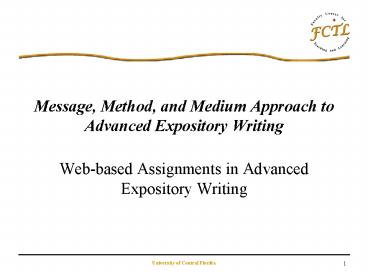Message, Method, and Medium Approach to Advanced Expository Writing
1 / 14
Title:
Message, Method, and Medium Approach to Advanced Expository Writing
Description:
Web-based classes are highly valued at UCF, especially by upper-level students ... photographs, art, poems, stories, magazines, comic strips, and advertisements. ... –
Number of Views:236
Avg rating:3.0/5.0
Title: Message, Method, and Medium Approach to Advanced Expository Writing
1
Message, Method, and Medium Approach to Advanced
Expository Writing
- Web-based Assignments in Advanced Expository
Writing
2
Introduction
3
The Setting
- Web-based classes are highly valued at UCF,
especially by upper-level students who have other
responsibilities and obligations in addition to
their educational pursuits. - Advanced Expository Writing is composed of
English majors and non-majors who want to
challenge their own writing styles and examine
how language functions in text.
4
Learning Problems and Goals
- Problems
- Students may feel intimidated by technology
demands. - Students may not have a strong background in
critical thinking and writing skills - Students may not understand the definition of
expository writing. - Students may feel that writing can only be taught
in a face-to-face environment. - Goals
- Make technology a seamless component of the class
- Design modules to gradually introduce WebCT tools
and to provide reward system - Incorporate online communication strategies to
promote a better quality of writing - Establish a learning community in a supportive
environment to decrease student paranoia - Use diverse teaching strategies and assignments
to engage students - Provide clear models and analysis of expository
writing
5
Creating the Learning Environment
- Instead of relying on printed essays in
traditional textbooks as the only interpretation
of text, the idea will expand to include
photographs, art, poems, stories, magazines,
comic strips, and advertisements. - Group presentations and discussions will be used
using WebCT tools. - Students will search, analyze, and evaluate
different variations of texts within the same
theme. - Students will rely on interactive technology for
personal interactions in order to create a
learning environment.
6
Outcomes
- Using self-reflection and relevant texts,
students will produce - four essays (self-reflection, comparison,
definition, argument) - final project using evidence from their own
personal lives - sophisticated writing samples
7
Outcomes - Projected
- Students will be able to
- broaden their definition of text
- consider the rhetorical situation of a text in
its evaluation - effectively apply the writing process (drafting,
revising, polishing) in the development of the
essay - work collaboratively as well as individually
- analyze their own and others writing styles and
rhetorical preferences - demonstrate vocabulary growth and concept
awareness through application in written works - provide relevant assignments that connect their
personal lives
8
Outcomes - Actual
- Outcomes will be demonstrated through four types
of essays - Self-reflection After you have explored the self
and place through different mediums (photos,
essays, and poems), use the narrative method to
write a personal, self-portrait of you and your
relationship with place. - Comparison After you have explored family and
community through different mediums (photographic
essays, commentaries, and advertisements), use
the comparison method to write about your own
family or community using a controlling metaphor
to integrate your audience from what is know to
what is not known about you subject.
9
Outcomes - Actual cont
- Definition After you have explored
language/writing through different mediums
(reviews/editorials, interviews, and speeches),
use the definitional method to write about how
language/writing defines who you are as a writer. - Argument Pick any of the themes used throughout
the semester (place, family/community,
language/writing), pick the best three mediums
that represents this theme, rank them, and defend
your answer with evidence.
10
Implementation
- Coming soon!
11
Implementation - Projected
- Resources needed
- WebCT website
- online texts
- tutorials/orientation
- Current difficulties
- time
- development of rubrics
- finding appropriate online texts
- strategies for group work
- students varying technology skills and resources
12
Implementation - Actual
- Coming soon!
13
Conclusion
- Advance Expository Writing invites students, who
already have a fair mastery - of the basic conventions of the written word,
including grammar and - punctuation, to reconsider their ideas about what
a "text" is and to give - consideration to how and why a "text" is
constructed. Students will either - choose a particular theme for the semester (based
on their own interests) or - use the themes of place, family/community,
language/writing, and writer as - witness. Using four different modes of writing
(self portrait, comparison, - definition, and argument) and examining examples
of each mode by looking at - the message, method, and medium of texts,
students will demonstrate mastery - by writing their own example of each writing
mode, ending with an argument - that takes a position of which medium works best
for a specific theme. - Students should be prepared to commit lots of
time to reading, writing, and - revising.
14
Attachments, links, etc.































